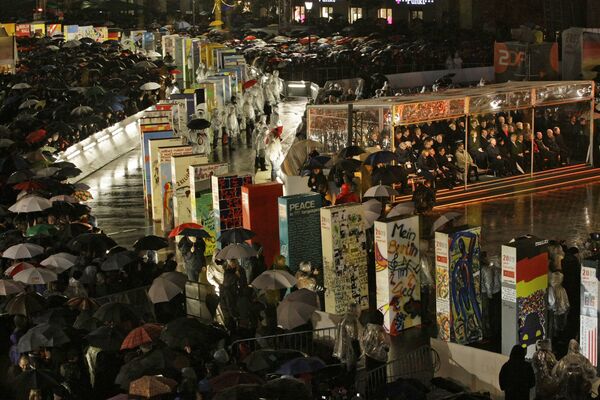BERLIN, November 9 (RIA Novosti) - Thousands of people gathered on Monday evening in front of the Brandenburg Gate despite steady rain for a concert marking the 20th anniversary of the fall of the Berlin Wall.
The guests of Chancellor Angela Merkel gathered on the podium included French President Nicolas Sarkozy, Russian President Dmitry Medvedev and the last Soviet leader, Mikhail Gorbachev.
"Here in Berlin, all of us hope that the period of confrontation has gone. The transition to the new, multipolar world today is very important for the majority of countries," the Russian president told the crowd.
Merkel, who grew up in communist East Germany, said the events of 20 years ago showed that the peoples of the world could conquer today's challenges.
"Together we brought down the Iron Curtain and I am convinced this can give us the strength for the 21st century," she said.
Sarkozy, British Prime Minister Gordon Brown and U.S. Secretary of State Hillary Clinton also spoke, the latter introducing a video message from President Barack Obama, who praised East Germans' courage.
"Even in the face of tyranny, people insisted that the world could change," he said. "Even as we celebrate these values, even as we mark this day, we know the work of freedom is never finished."
Sarkozy said the two world wars meant Germany and France had a special responsibility for peace and cooperation.
"If Europe stands for freedom, then it is above all the peoples of Germany and France...who have an immense responsibility for friendship, fraternity and solidarity," he said.
While Germany and France have stood at the center of the European project for the past half century, Britain has often been on the outside, but Brown committed his country to a greater role.
"I pledge here today that Britain will always be at the heart of Europe - we will never give succor to extremism which would drive people apart," said the British prime minister, whose predecessor Tony Blair hopes to be the first EU president when the post is created later this year.
After World War II, the victorious countries divided Germany into four zones of occupation - Soviet, U.S., British and French - which became East and West Germany. The 160-km barrier between East and West Berlin, first erected in 1961, became the symbolic demarcation line between the socialist camp in Eastern Europe and the West.
Daniel Barenboim conducted the Berlin State Choir in the overture to Wagner's Lohengrin, which the Israeli said was dedicated to another anniversary - Kristallnacht, the anti-Jewish pogroms of November 9, 1938, that set the tone for the Holocaust.


